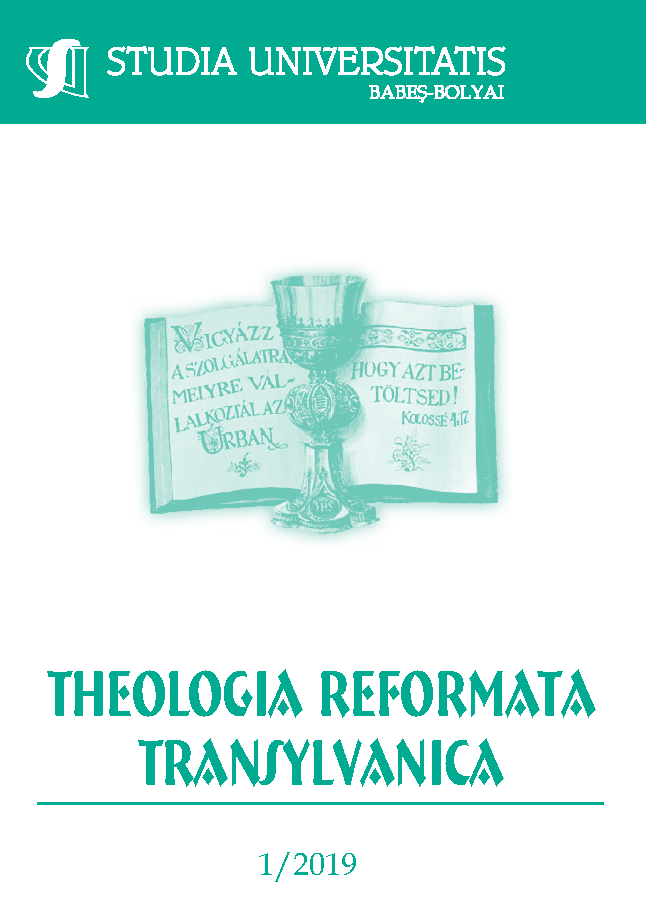Money Matters in Pastoral Vocation – An Empirical Study
DOI:
https://doi.org/10.24193/subbtref.64.1.11Keywords:
pastor, theology, money, ambivalence, valueAbstract
The interviews conducted with the 33 Reformed Pastors in the Reformed Church in Hungary make it clear that that their relation to money bears an intrinsic ambivalence, which is part of pastoral identity. Living on the border between two worlds, the pastor carries the message of the Kingdom of God and represents a spiritual value system and lifestyle that is meant to be different from that of our world. Mostly, a shortage of money, social or clerical unfairness is mentioned in the interviews, however, amounts of money that are more than necessary can also create tension in a pastor’s life.References
ADAMS, J.S.: Inequity in social exchange, in: BERKOWITZ, Leonard (ed.): Advances in Experimental Social Psychology, Vol. 2, Academic Press, New York, 1965. 267–299.
ADAMS, J.S.: Toward an understanding of inequity, in: Journal of Abnormal and Social Psychology, 1965, Vol. 67. 422–436.
BAKACSI Gyula: A szervezeti magatartás alapjai, Budapest, AULA, 2010.
BAUER, W.: „Griechisch-deutsches Wörterbuch zu den Schriften des Neuen Testaments und der frühchristlichen Literatur”, Walter de Gruyter, Berlin–New York, 1988.
BODÓ, Sára: Lelkipásztori hivatás és spiritualitás, in: FAZAKAS, Sándor – FERENCZ, Árpád (szerk.): „Krisztusért járva követségben…” Teológia – igehirdetés – egyházkormányzás: Tanulmánykötet a 60 éves Bölcskei Gusztáv születésnapjára, (Acta Theologica Debrecinensis; 3.) Debreceni Református Hittudományi Egyetem, Debrecen, 2012. 303–320
CHAPMAN, Gary: Egymásra hangolva - Az öt szeretetnyelv, Harmat Kiadó, Budapest, 2003.
FOA, Edna B. – FOA, Uriel G.: Resource Theory of Social Exchange, in: TÖRNBLOM, K. – KAZEMI, A. (eds.): Handbook of Social Resource Theory: Theoretical Extensions, Empirical Insights, and Social Applications, Critical Issues in Social Justice, Springer Science+Business Media, New York, 2012. 15–33.
FODOR László: Gazdaságpszichológia, Noran Libro, Budapest, 2013.
GOODCHILD, P.: Theology of Money, SCM Press, London, 2007.
HAGEN, Jürgen von – WELKER, M. (eds.): Money as God? The Monetisation of the Market and its Impact on Religion, Politics, Law, and Ethics, Cambridge University Press, Cambridge, 2014.
HAILER, M.: Gott und die Götzen: über Gottes Macht angesichts der lebensbestimmenden Mächte, Vandenhoeck & Ruprecht, Göttingen, 2006. 361–366.
HERZBERG, F.: One More Time: How Do You Motivate Employees?, in: Harvard Business Review 46., 1968/1. 53–62.
JOSUTTIS, M.: Der Pfarrer ist anders – Aspekte einer zeitgenössischen Pastoraltheologie, Ch. Kaiser, München, 1982.
KARRENBERG, F.: Geld – IV. Sozialethisch, in: Die Religion in Geschichte und Gegenwart – Handwörterbuch für Theologie und Religionswissenschaft, Zwieter Band: D-G, Mohr, Tübingen, 1980. 1318–1320.
KOPP Mária – SKRABSKI Árpád: Magyar lelkiállapot az ezredforduló után, in Távlatok/86. 2009. 32–53.
KŐRÖSSY Judit – LISZNYAI Sándor: A pénz pszichológiája és a gazdasági szocializáció, in: HUNYADY György – SZÉKELY Mózes (szerk.): Gazdaságpszichológia, Osiris, Budapest, 2003. 249–380.
MASLOW, A.: A lét pszichológiája felé, Ursus Libris, Budapest, 2003.
MIHÁLYFI Ákos: A papnevelés története és elmélete, I. kötet, Szent István Társulat, Budapest, 1896.
NAGY Károly Zsolt: Max Weber Protestáns etikájának recepciója a magyar református teológiában a második világháború előtt, in: HOPPÁL Mihály (főszerk.) – BERTA Péter (szerk.): Ethno-lore. A Magyar Tudományos Akadémia Néprajzi Kutatóintézetének Évkönyve, XXVI. MTA Néprajzi Kutatóintézet, Budapest, 2009. 239–261.
NEEDLEMAN, J.: Money and the Meaning of Life, Doubleday, 1994.
MORTON, Andrew R.: A határon élni, in: „Hálával áldozzál…” – A Károli Gáspár Re-formátus Egyetem Hittudományi Kara tiszteletbeli doktorainak tanulmányai a 150. évforduló ünnepén, KRE-HTK, Budapest, 2005. 377–389.
PACHMANN, H.: Pferrer sein – Ein Beruf und eine Berufung im Wandel, Vanderhoeck & Ruprecht, Göttingen, 2011.
POLÁNYI Károly: Kereskedelem, piacok és pénz az ókori Görögországban, Gondolat, Budapest, 1984. 304–313.
RUFF Tibor: Lehetnek-e gazdagok a keresztények? in: Új Exodus, 2001, XII. évf., 2-3. szám. 46–55.
SZABÓ B. András: A pénz mint teológiai probléma – Az áldozattól a pszeudoeszkatológiáig, Evangélikus Hittudományi Egyetem, Budapest, 2015.
SZONDY Máté: Anyagi helyzet és boldogság: kapcsolat individuális és nemzetközi szinten, in: Mentálhigiéné és Pszichoszomatika, 2007, 8 (4). 291–307.
TAKÁCS Sándor – CSILLAG Sára – KISS Csaba – SZILAS Roland: Még egyszer a motivációról, avagy „Hogyan ösztönözzük alkalmazottainkat itt és most?, in: Vezetéstudomány, XLIII. évf., 2012, 2. szám. 2–17.
TAYLOR, S.: Soul and Money A Theology of Wealth, Episcopal Church Center, New York, 1991.
WARIBOKO, N.: God and Money: A Theology of Money in a Globalizing World, Lexington Books, Lanham, 2008.
WEBER, M.: A protestáns etika és a kapitalizmus szelleme, Gondolat, Budapest, 1982.
WEST, M.: Tie Your Camel to the Hitching Post – An Interview with Jacob Needleman, in: Personal Transformation, vol. 8., nr. 5., 2000. 43–48.
Downloads
Published
How to Cite
Issue
Section
License
Copyright (c) 2019 Studia Universitatis Babeș-Bolyai Theologia Reformata Transylvanica

This work is licensed under a Creative Commons Attribution-NonCommercial-NoDerivatives 4.0 International License.






